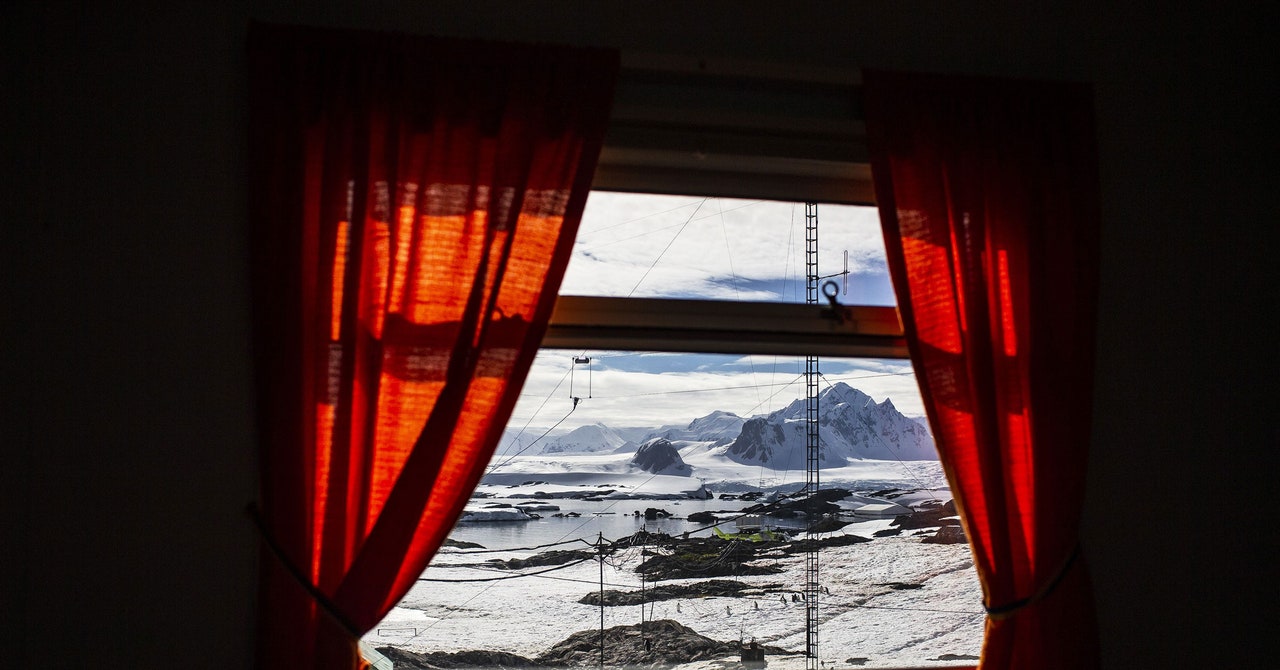
Almost 9,500 miles from Kyiv, the Ukrainian flag flutters above a handful of squat, scattered buildings perched on a half-mile-long island at the very edge of Antarctica. This is Vernadsky Station, Ukraine’s only research base in Antarctica and home to 12 scientists, engineers, and support staff who were nearing the end of a 13-month-long expedition when Russia invaded. Now these polar residents are stuck in one of the most remote spots on Earth while back at home their friends and family take cover in bomb shelters or prepare to fight against the invading Russian forces.
“It’s really agonizing to be here unable to fight the occupation of my homeland,” says Andrii Khytryi, an anesthesiologist and emergency medicine physician from Poltava in central Ukraine. As the expedition doctor, Khytryi’s main task is to monitor the physiological and mental condition of the other team members. Mostly their health is “holding up”, he says, but at times the pressure of being unable to help their loved ones and country becomes difficult to contain. “For some it is close to unbearable. Sometimes the stress is so strong that I need to assist my colleagues with drugs to normalize the blood pressure or insomnia.”
Khytryi is desperate to get back to Ukraine and help defend his country. “I believe that I would have been much more useful treating the wounded in an operating room or emergency room, or in the field,” he says. But the doctor who was due to replace him as part of the next expedition is now fighting in Ukraine. It looks like Khytryi may have to spend another year in Antarctica. “I feel that it is my duty to stay here if there is no one to swap with me,” he says.
March is the tail end of the Antarctic summer, with the temperature at Vernadsky hovering around zero degrees Celsius. In normal times, the summer months would mean visits from tourists who come to watch penguins and visit the base’s wood-paneled bar: a legacy of its previous British owners. But now the atmosphere on the base is much more serious, says Anton, a biologist from Kharkiv, Ukraine’s second-largest city (like others WIRED spoke to for this piece, he declined to provide his surname). “The usual way of life that has developed over a year of living in a small autonomous team has changed. We practically do not spend leisure time together,” he says. Most of the time, Anton and his colleagues are either working, reading the news or keeping in touch with their loved ones back home.
Ukraine’s largest TV broadcasters have merged their coverage into a single rolling-news channel which plays on a screen in the base’s common room. Occasionally snow blocks the satellite dish that the station relies on for its internet connection, but most of the time the researchers are able to follow news of the invasion through official sources and messaging apps. “The physical distance does not turn me into an outsider because I’m still connected to Ukraine with mental bonds: my family, my friends, my colleagues, my memories and my aspirations,” says Khytryi.
Although he is nearly 10,000 miles from home, Anton also feels connected to his family and friends back in Kharkiv. “We communicate via the internet. They are safe. They stay in shelters, sometimes they are at home,” he says. Kharkiv, in the northeast of Ukraine, has been under intense shelling from Russian forces, including attacks on non-military buildings, according to reporting from The Guardian. “The invaders are trying to take over the city,” Anton says.
Anton and Khytryi are part of the twenty-sixth Ukrainian expedition to Vernadsky since 1996—the year that ownership of the base was transferred from the United Kingdom to Ukraine. After the collapse of the Soviet Union in 1991, Russia declared itself the sole owner of the former Soviet Union’s five research stations in Antarctica and denied Ukraine’s request to take over operation of one of the bases. Instead, the British government offered to sell what was then called the Faraday station to the Ukrainian government for a symbolic £1. Since then, the station has been permanently staffed by at least a dozen Ukrainians: A signpost marks the huge distance between Vernadsky and the cities that its researchers hail from.


